1992.11.DD - Guitar World - Trial By Fire (Slash, Gilby)
Page 1 of 1
 1992.11.DD - Guitar World - Trial By Fire (Slash, Gilby)
1992.11.DD - Guitar World - Trial By Fire (Slash, Gilby)
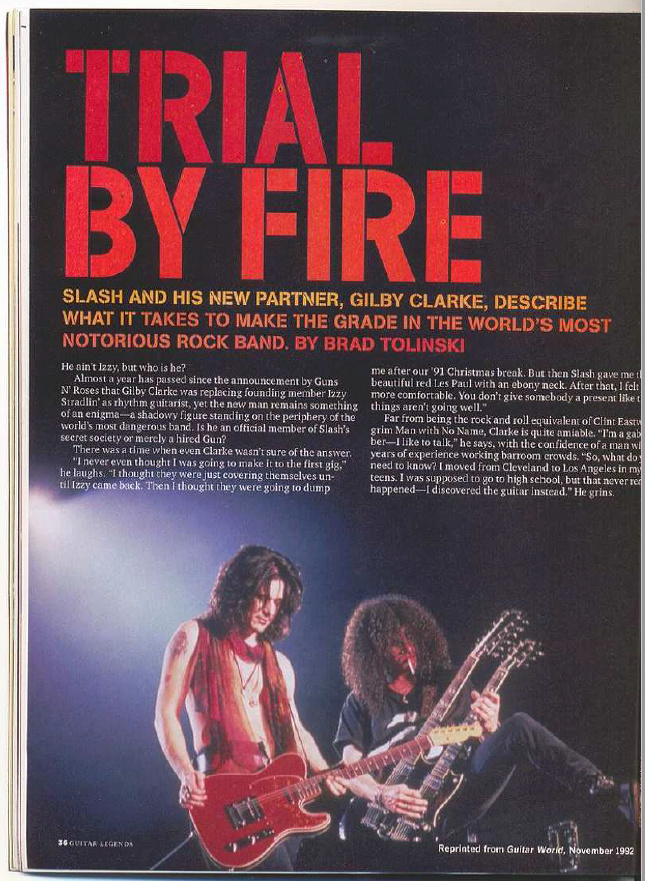
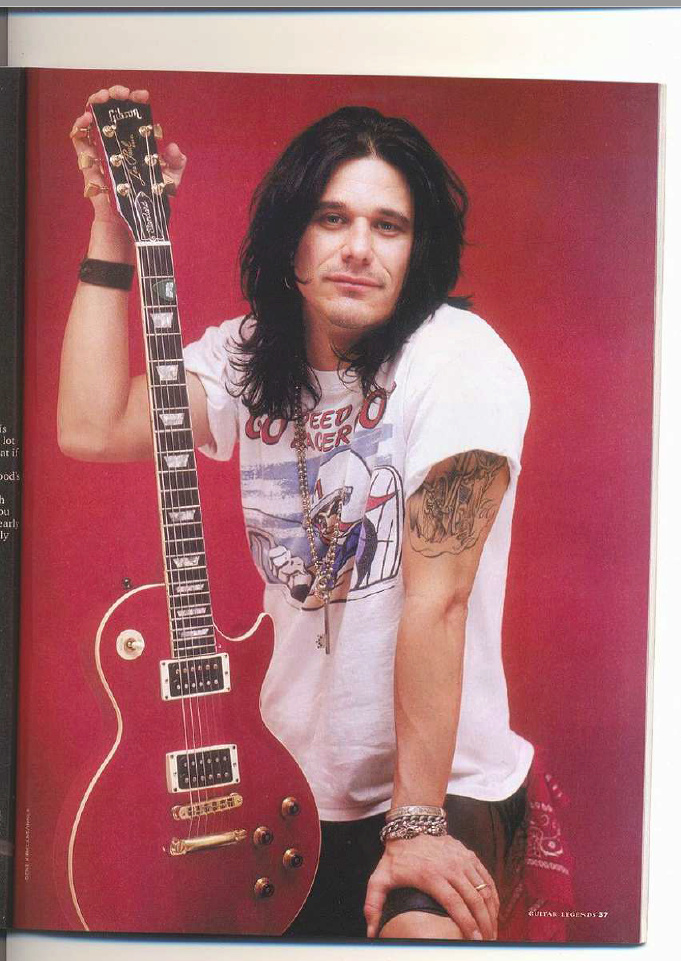
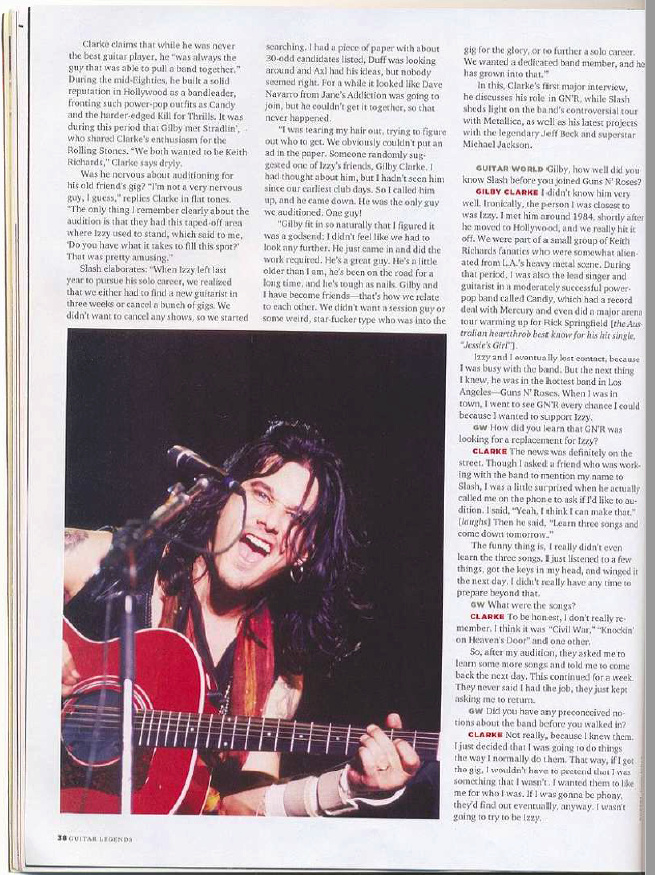
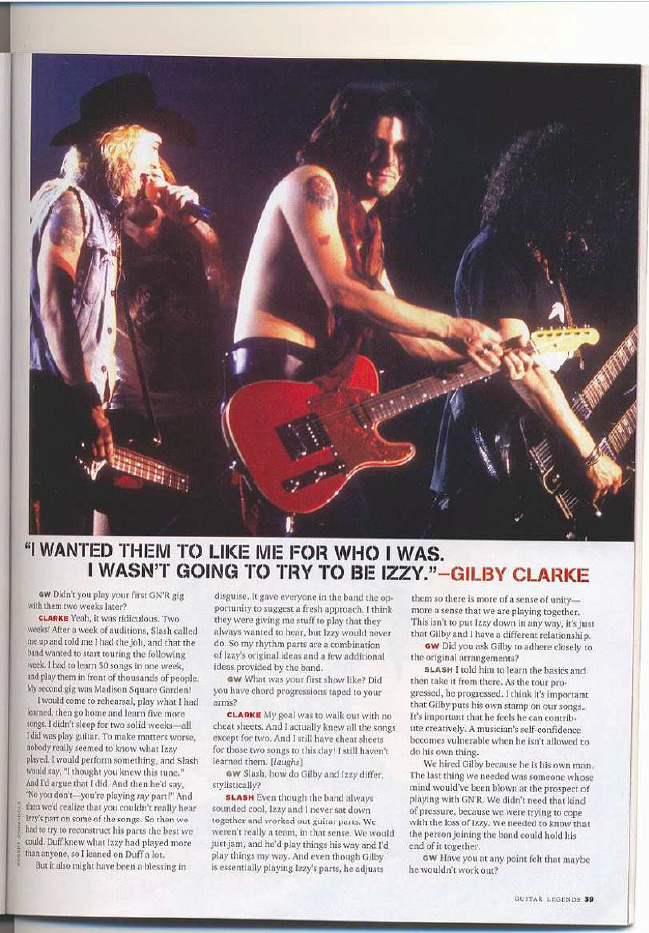
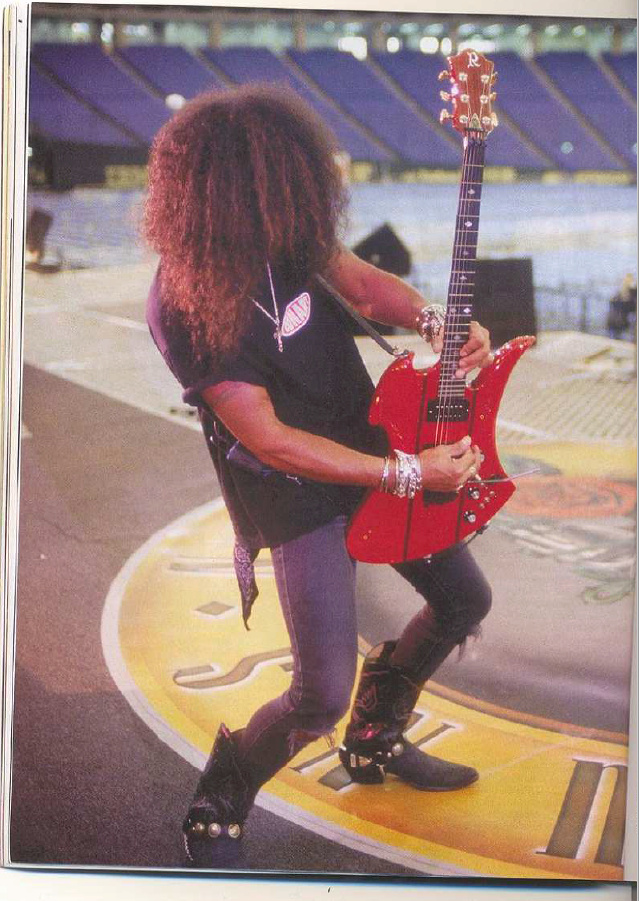
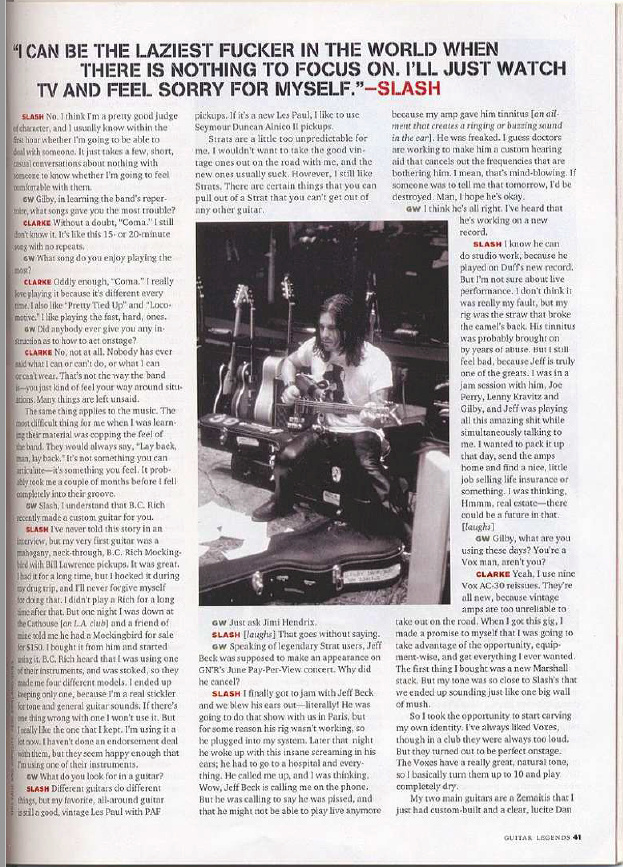
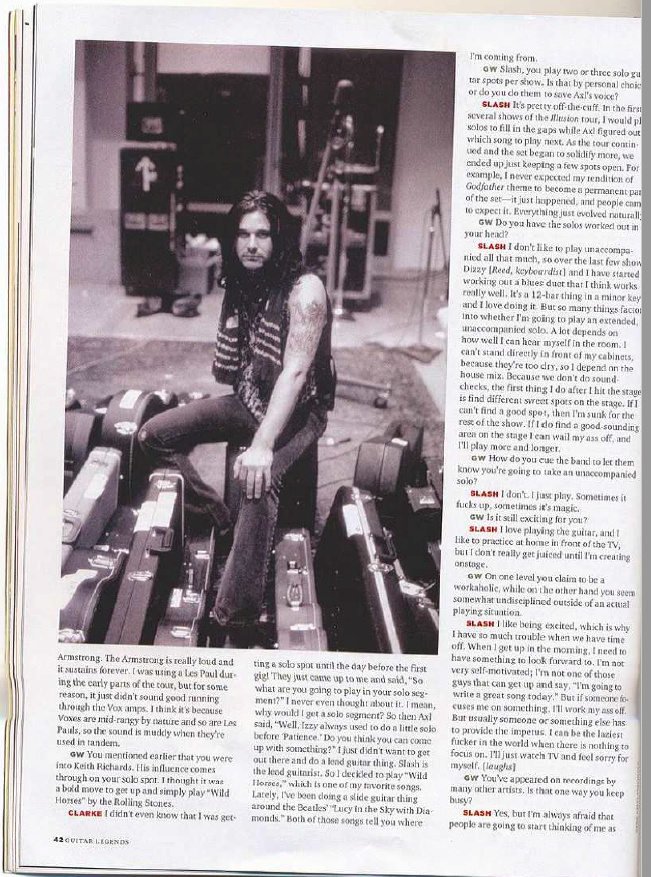
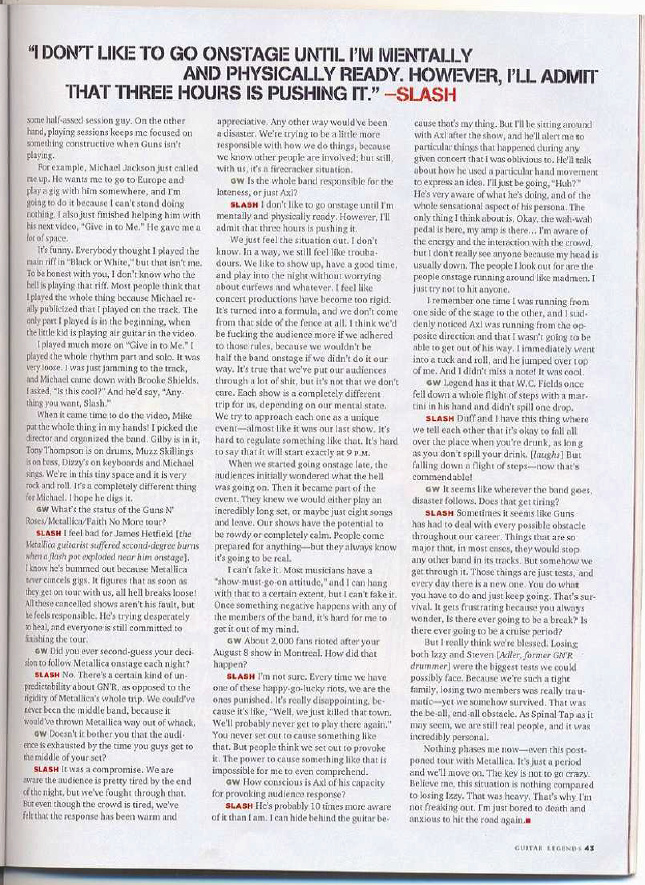
Trial by fire
Slash and his new partner, Gilby Clarke describe what it takes to make the grade in the world's most notorious rock band.
He Ain't Izzy, but who is he?
Almost a year has passed since the announcement by Guns N' Roses that Gilby Clarke was replacing founding member Izzy Stradlin' as rhythm guitarist, yet the new man remains something of an enigma - a shadowy figure, standing on the periphery of the world's most dangerous band. Is he an official member of Slash's secret society or merely a hired Gun?
There was a time when even Clarke wasn't sure of the answer.
"I never even thought I was going to make it to the first gig," he laughs. "I thought they were just covering themselves until Izzy came back. Then I thought they were going to dump me after our '91 Christmas break. But then Slash gave me this beautiful red Les Paul with an ebony neck. After that, I felt a lot more comfortable. You don't give somebody a present like that if things aren't going well."
Far from being the rock and roll equivalent of Clint Eastwood's grim Man With No Name, Clarke is quite amiable. "I'm a gabber. I like to talk," he says, with the confidence of a man with years of experience working barroom crowds. "So, what do you need to know? I moved from Cleveland to Los Angeles in my early teens. I was supposed to go to high school, but that never really happened - I discovered the guitar instead." He grins.
Clarke claims that while he was never the best guitar player, he "was always the guy that was able to pull a band together." During the mid-Eighties, he built a solid reputation in Hollywood as a bandleader, fronting such power-pop outfits as Candy and the harder-edged Kill For Thrills. It was during this period that Gilby met Stradlin', who shared Clarke's enthusiasm for the Rolling Stones. "We both wanted to be Keith Richards," Clarke says dryly.
Was he nervous about auditioning for his old friend's gig? "I'm not a very nervous guy, I guess," replies Clarke in flat tones. "The only thing I remember clearly about the audition is that they had this taped-off area where Izzy used to stand, which said to me, 'Do you have what it takes to fill this spot?' That was pretty amusing."
Slash elaborates: "When Izzy left last year to pursue his solo career, we realized that we either had to find a new guitarist in three weeks or cancel a bunch of gigs. We didn't want to cancel any shows, so we started searching. I had a piece of paper with about 30-odd candidates listed. Duff was looking around and Axl had his ideas, but nobody seemed right. For a while it looked like Dave Navarro from Jane's Addiction was going to join, but he couldn't get it together, so that never happened.
"I was tearing my hair out, trying to figure who to get. We obviously couldn't put an ad in the paper. Someone randomly suggested one of Izzy's friends, Gilby Clarke. I had thought about him, but I hadn't seen him since our earliest club days. So I called him up, and he came down. He was the only guy we auditioned. One guy!
"Gilby fit in so naturally that I figured it was a godsend; I didn't feel like we had to look any further. He just came in and did the work required. He's a great guy. He's a little older than I am, he's been on the road for a long time, and he's tough as nails. Gilby and I have become friends - that's how we relate to each other. We didn't want a session guy or some weird, star-fucker type who was into the gig for the glory, or to further a solo career. We wanted a dedicated band member, and he has grown into that."
In this, Clarke's first major interview, he discusses his role in GN'R, while Slash sheds light on the band's controversial tour with Metallica, as well as his latest projects with the legendary Jeff Beck and superstar Michael Jackson.
Gilby, how well did you know Slash before you joined Guns N' Roses?
I didn't know him very well. Ironically, the person I was closest to was Izzy. I met him around 1984, shortly after he moved to Hollywood, and we really hit it off. We were part of a small group of Keith Richards fanatics who were somewhat alienated from L.A.'s heavy metal scene. During that period, I was also the lead singer and guitarist in a moderately successful power-pop band called Candy, which had a record deal with Mercury and even did a major arena tour warming up for Rick Springfield [the Australian heartthrob best known for his hit single, "Jesse's Girl"].
Izzy and I eventually lost contact, because I was busy with the band. But the next thing I knew, he was in the hottest band in Los Angeles - Guns N' Roses. When I was in town, I went to see GN'R every chance I could because I wanted to support Izzy.
How did you learn that GN'R was looking for a replacement for Izzy?
The news was definitely on the street. Though I asked a friend who was working with the band to mention my name to Slash, I was a little surprised when he actually called me on the phone to ask if I'd like to audition. I said, "Yeah, I think I can make that." [laughs] Then he said, "Learn three songs and come down tomorrow."
The funny thing is, I really didn't even learn the three songs, I just listened to a few things, got the keys in my head, and winged in the next day. I didn't really have any time to prepare beyond that.
What were the three songs?
To be honest, I don't really remember. I think it was "Civil War," "Knocking On Heaven's Dorr" and one other.
So, after my audition, they asked me to learn some more songs and told me to come back the next day. This continued for a week. They never said I had the job, they just kept asking me to return.
Did you have any preconceived notions about the band before you walked in?
Not really, because I knew them. I just decided that I was going to do things the way I normally do them. That way, if I got the gig, I wouldn't have to pretend that I was something that I wasn't. I wanted them to like me for who I was. If I was gonna be phony, they'd find out eventually, anyway. I wasn't going to try to be Izzy.
Didn't you play your first GN'R show with them two weeks later?
Yeah, it was ridiculous. Two weeks! After a week of auditions, Slash called me up and told me I had the job, and that the band wanted to start touring the following week. I had to learn 50 songs in one week, and play them in front of thousands of people. My second gig was Madison Square Garden! I would come to rehearsal, play what I had learned, then go home and learn five more songs. I didn't sleep for two solid weeks - all I did was play guitar. To make matters worse, nobody really seemed to know what Izzy played. I would perform something, and Slash would say, "I thought you knew this tune." And I'd argue that I did. And then he'd say, "No you don't - you're playing my part!" And then we'd realize that you couldn't really hear Izzy's part on some of the songs. So then we had to try to reconstruct his parts the best we could. Duff knew what Izzy had played more than anyone, so I leaned on Duff a lot.
But it also might have been a blessing in disguise. It gave everyone in the band the opportunity to suggest a fresh approach. I think they were giving me stuff to play that they always wanted to hear, but Izzy would never do. So my rhythm parts are a combination of Izzy's original ideas, some of my ideas and a few additional ideas provided by the band.
What was your first show like? Did you have chord progressions taped to your arms?
My goal was to walk out with no cheat sheets. And I actually knew all the songs except for two. And I still have cheat sheets for those two songs to this day! I still haven't learned them. [laughs]
Slash, how do Gilby and Izzy differ, stylistically?
Even though the band always sounded cool, Izzy and I never sat down together and worked out guitar parts. We weren't really a team, in that sense. We would just jam, and he'd play things his way and I'd play things my way. And even though Gilby is essentially playing Izzy's parts, he adjusts them so there is more of a sense of unity - more of a sense that we are playing together. This isn't to put Izzy down in any way, it's just that Gilby and I have a different relationship.
Did you ask Gilby to adhere closely to the original arrangements?
I told him to learn the basics and then take it from there. As the tour progressed, he progressed. I think it's important that Gilby put his own stamp on our songs. It's important that he feels he can contribute creatively. A musician's self-confidence becomes vulnerable when he isn't allowed to do his own thing.
We hired Gilby because he is his own man. The last thing we needed was someone whose mind would've been blown at the prospect of playing with GN'R. We didn't need that kind of pressure, because we were trying to cope with the loss of Izzy. We needed to know that the person joining the band could hold his end of it together.
Have you at any point felt that maybe he wouldn't work out?
No. I think I'm a pretty good judge of character, and I usually know within the first hour whether I'm going to be able to deal with someone. It just takes a few, short, casual conversations about nothing with someone to know whether I'm gong to feel comfortable with them.
Gilby, in learning the band's repertoire, what songs gave you the most trouble?
Without a doubt, "Coma." I still don't know it. It's like this 15- or 20-minute song with no repeats.
What song do you enjoy playing the most?
Oddly enough, "Coma." I really love playing it because it's different every time. I also like "Pretty Tied Up" and "Locomotive." I like playing the fast, hard ones.
Did anybody ever give you any instruction as to how to act on stage?
No, not at all. Nobody has ever said what I can or can't do, or what I can or can't wear. That's not the way the band is - you just kind of feel your way around situations. Many things are left unsaid. The same thing applies to the music. The most difficult thing for me when I was learning their material was copping the feel of the band. They would always say, "Lay back, man, lay back." It's not something you can articulate - it's something you feel. It probably took me a couple of months before I fell completely into their groove.
Slash, I understand that B.C. Rich recently made a custom guitar for you.
I've never told this story in an interview, but my very first guitar was a mahogany, neck-through, B.C. Rich Mockingbird with Bill Lawrence pickups. It was great. I had it for a long time, but I hocked it during my drug trip, and I'll never forgive myself for doing that. I didn't play a Rich for a long time after that. But one night I was down at the Cathouse [an L.A. club] and a friend of mine told me he had a Mockingbird for sale for $150. I bought it from him and started using it. B.C. Rich heard that I was using one of their instruments, and was stoked, so they made me four different models. I ended up keeping only one, because I'm a real stickler for tone and general guitar sounds. If there's one thing wrong with one I won't use it. But I really like the one that I kept. I'm using it a lot now. I haven't done an endorsement deal with them, but they seem happy enough that I'm using one of their instruments.
What do you look for in a guitar?
Different guitars do different things, but my favorite, all-around guitar is still a good, vintage Les Paul with PAF pickups. If it's a new Les Paul, I like to use Seymour Duncan Alnico II pickups. Strats are a little too unpredictable for me. I wouldn't want to take the good vintage ones out on the road with me, and the new ones usually suck. However, I still like Strats. There are certain things that you can pull out of a Strat that you can't get out of any other guitar.
Just ask Jimi Hendrix.
[laughs] That goes without saying.
Speaking of legendary Strat users, Jeff Beck was supposed to make an appearance on GN'R's June Pay-Per-View concert. Why did he cancel?
I finally got to jam with Jeff Beck and we blew his ears out - literally! He was going to do that show with us in Paris, but for some reason his rig wasn't working, so he plugged into my system, Later that night we woke up with this insane screaming in his ears; he had to go to a hospital and everything. He called me up, and I was thinking, "Wow, Jeff Beck is calling me on the phone." But he was calling to say he was pissed, and that he might not be able to play live anymore because my amp gave him tinnitus [an ailment that creates a ringing or buzzing sound in the ear]. He was freaked. I guess doctors are working to make him a custom hearing aid that cancels out the frequencies that are bothering him. I mean, that's mind-blowing. If someone was to tell me that tomorrow, I'd be destroyed. Man, I hope he's okay.
I think he's all right. I've heard that he's working on a new record.
I know he can do studio work, because he played on Duff's new record. But I'm not sure about live performance. I don't think it was really my fault, but my rig was the straw that broke the camel's back. His tinnitus was probably brought on by years of abuse. But I still feel bad, because Jeff is truly one of the greats. I was in a jam session with him, Joe Perry, Lenny Kravitz and Gilby, and Jeff was playing all this amazing shit while simultaneously talking to me. I wanted to pack it up that day, send the amps home and find a nice, little job selling life insurance or something. I was thinking, "Hmmm, real estate - there could be a future in that." [laughs]
Gilby, what are you using these days? You're a Vox man, aren't you?
Yeah, I use all nine Vox AC-30's reissues. They're all new, because vintage amps are too unreliable to take out on the road. When I got this gig, I made a promise to myself that I was going to take advantage of the opportunity, equipment-wise, and get everything I ever wanted. The first thing I bought was a new Marshall stack. But my tone was so close to Slash's that we ended up something like one big wall of mush.
So I took the opportunity to start carving my own identity. I've always liked Voxes, though in a club they were always too loud. But they turned out to be perfect on stage. The Voxes have a really great, natural tone, so I basically turn them up to 10 and play completely dry.
My two main guitars are a Zemaitis that I just had custom-built and a clear, lucite Dan Armstrong. The Armstrong is really loud and it sustains forever. I was using a Les Paul during the early parts of the tour, but for some reason, it just didn't sound good running through the Vox amps. I think it's because Voxes are mid-rangy by nature and so are Les Pauls, so the sound is muddy when they're used in tandem.
You mentioned earlier that you were into Keith Richards. His influence comes through on your solo spot. I thought it was a bold move to get up and simply play "Wild Horses" by the Rolling Stones.
I didn't even know that I was getting a solo spot until the day before the first gig! They just came up to me and said, "So what are you going to play in your solo segment?" I mean, why would I get a solo segment? So then Axl said, "Well, Izzy always used to do a little solo before 'Patience.' Do you think you can come up with something?" I just didn't want to get out there and do a lead guitar thing. Slash is the lead guitarist. So I decided to play "Wild Horses," which is one of my favorite songs. Lately, I've been doing a slide guitar thing around The Beatles' "Lucy In The Sky With Diamonds." Both of those songs tell you where I'm coming from.
Slash, you play two or three solo guitar spots per show. Is that by personal choice or do you do them to save Axl's voice?
It's pretty off-the-cuff. In the first several shows of the Illusion tour, I would play solos to fill in the gaps while Axl figured out which song to play next. As the tour continued and the set began to solidify more, we ended up just keeping a few spots open. For example, I never expected my rendition of "The Godfather Theme" to become a permanent part of the set - it just happened, and people came to expect it. Everything just evolved naturally.
Do you have the solos worked out in your head?
I don't like to play unaccompanied all that much, so over the last few shows Dizzy [Reed, keyboardist] and I have started working out a blues duet that I think works really well. It's a 12-bar thing in a minor key, and I love doing it. But so many things factor into whether I'm going to play an extended, unaccompanied solo. A lot depends on how well I can hear myself in the room. I can't stand directly in front of my cabinets, because they're too dry, so I depend on the house mix. Because we don't do soundchecks, the first thing I do after I hit the stage is find different sweet spots on the stage. If I can't find a good spot, then I'm sunk for the rest of the show. If I do find a good-sounding area on stage, I can wail my ass off, and I'll play more or longer.
How do you cue the band to let them know you're going to take an unaccompanied solo?
I don't. I just play. Sometimes it fucks up, sometimes it's magic.
Is it still exciting for you?
I love playing the guitar, and I like to practice at home in front of the TV, but I don't really get juiced until I'm creating on stage.
On one level you claim to be a workaholic, while on the other hand you seem somewhat undisciplined outside of an actual playing situation.
I like being excited, which is why I have so much trouble when we have time off. When I get up in the morning, I need to have something to look forward to. I'm not very self-motivated; I'm not one of those guys that can get up and say, "I'm going to write a great song today." But if someone focuses me on something, I'll work my ass off. But usually someone or something else has to provide the impetus. I can be the laziest motherfucker in the world when there is nothing to focus on. I'll just watch TV and feel sorry for myself. [laughs]
You've appeared on recordings by many other artists. Is that one way you keep busy?
Yes, but I'm always afraid that people are going to start thinking of me as some half-assed session guy. On the other hand, playing sessions keeps me focused on something constructive when Guns isn't playing.
For example, Michael Jackson just called me up. He wants me to go to Europe and play a gig with him somewhere, and I'm going to do it because I can't stand doing nothing. I also just finished helping him with his next video, "Give In To Me." He gave me a lot of space.
It's funny. Everybody thought I played the main riff in "Black or White," but that isn't me. To be honest with you, I don't know who the hell is playing that riff. Most people think that I played the whole thing because Michael really publicized that I played on the track. The only part I played is in the beginning, when the little kid is playing air guitar in the video. I played much more on "Give In To Me." I played the whole rhythm part and solo. It was very loose. I was just jamming to the track, and Michael came down with Brooke Shields. I asked, "Is this cool?" and he'd say, "Anything you want, Slash."
When it came time to do the video, Mike put the whole thing in my hands! I picked the director and organized the band. Gilby is in it, Tony Thompson is on drums, Muzz Skillings is on bass, Dizzy's on keyboards and Michael sings. We're in this tiny space and it is very rock and roll. It's a completely different thing for Michael. I hope he digs it.
What's the status of the Guns N' Roses, Metallica, Faith No More tour?
I feel bad for James Hetfield [the Metallica guitarist suffered second-degree burns when a flash pot exploded near him on stage]. I know he's bummed out because Metallica never cancels gigs. It figures that as soon as they get on tour with us, all hell breaks loose! All these cancelled shows aren't his fault, but he feels responsible. He's trying desperately to heal, and everyone is still committed to finishing the tour.
Did you ever second-guess your decision to follow Metallica on stage each night?
No. There's a certain kind of unpredictability about GN'R, as opposed to the rigidity of Metallica's whole trip. We could've never been the middle band, because it would've thrown Metallica way out of whack.
Doesn't it bother you that the audience is exhausted by the time you guys get to the middle of your set?
It was a compromise. We are aware the audience is pretty tired by the end of the night, but we've fought through that. But even though the crowd is tired, we've felt that the response has been warm and appreciative. Any other way would've been a disaster. We're trying to be a little more responsible with how we do things, because we know other people are involved; but still, with us, it's a firecracker situation.
Is the whole band responsible for the lateness, or just Axl?
I don't like to go on until I'm mentally and physically ready. However, I'll admit that three hours is pushing the limits.
We just feel the situation out. I don't know. In a way, we still feel like troubadours. We like to show up, have a good time, and play into the night without worrying about curfews and whatever. I feel like concert productions have become too rigid. It's turned into a formula, and we don't come from that side of the fence at all. I think we'd be fucking the audience more if we adhered to those rules, because we wouldn't be half the band on stage if we didn't do it our way. It's true that we've put our audiences through a lot of shit, but it's not that we don't care. Each show is a completely different trip for us, depending on our mental state. We try to approach each one as a unique event - almost like it was our last show. It's hard to regulate something like that. It's hard to say that it will start exactly at 9 p.m.
When we started going on stage late, the audience initially wondered what the hell was going on. Then it became part of the event. They knew we would either play an incredibly long set, or maybe just eight songs and leave. Our shows have the potential to be rowdy or completely calm. People come prepared for anything - but they always know it's going to be real.
I can't fake it. Most musicians have a "show-must-go-on attitude," and I can hang with that to a certain extent, but I can't fake it. Once something negative happens with any of the members of the band, it's hard for me to get it out of my mind.
About 2,000 fans rioted after your August 8 show in Montreal. How did that happen?
I'm not sure. Every time we have one of these happy-go-lucky riots, we are the ones punished. It's really disappointing, because it's like, "Well, we just killed that town. We'll probably never get to play there again." You never set out to cause something like that. But people think we set out to provoke it. The power to cause something like that is impossible for me to even comprehend.
How conscious is Axl of his capacity for provoking audience response?
He's probably 10 times more aware of it than I am. I can hide behind the guitar because that's my thing. But I'll be sitting around with Axl after the show, and he'll alert me to particular things that happened during any given concert that I was oblivious to. He'll talk about how he used a particular hand movement to express an idea. I'll just be going, "Huh?" He's very aware of what he's doing, and of the whole sensational aspect of his persona. The only thing I think about is, "Okay, the wah-wah pedal is here, my amp is there..." I'm aware of the energy and the interaction with the crowd, but I don't really see anyone because my head is usually down. The people I look out for are the people on stage running around like madmen. I just try not to hit anyone.
I remember one time I was running from one side of the stage to the other, and I suddenly noticed Axl was running from the opposite direction and that I wasn't going to be able to get out of his way. Immediately went into a tuck and roll, and he jumped over the top of me. And I didn't miss a note! It was cool.
Legend has it that W.C. Fields once fell down a whole flight of steps with a martini in his hand and didn't spill one drop.
Duff and I have this thing where we tell each other that it's okay to fall all over the place when you're drunk, as long as you don't spill your drink. [laughs] But falling down a flight of steps - now that's commendable!
It seems like wherever the band goes, disaster follows. Does that get tiring?
Sometimes it seems like Guns has had to deal with every possible obstacle throughout our career. Things that are so major that, in most cases, they would stop any other band in its tracks. But somehow we get through it. Those things are just tests, and every day there is a new one. You do what you have to do and just keep going. That's survival. It gets frustrating because you always wonder, "Is there ever going to be a break? Is there ever going to be a cruise period?"
But I really think we're blessed. Losing both Izzy and Steven [Adler, former GN'R drummer] were the biggest tests we could possibly face. Because we're such a tight family, losing two members was really traumatic - yet we somehow survived. That was the be-all, end-all obstacle. As Spinal Tap as it may seem, we are still real people, and it was incredibly personal.
Nothing phases me now - even this postponed tour with Metallica. It's just a period and we'll move on. The key is not to go crazy. Believe me, this situation is nothing compared to losing Izzy. That was heavy. That's why I'm not freaking out. I'm just bored to death and anxious to hit the road again.
- Attachments

Soulmonster- Band Lawyer
-

Posts : 15854
Plectra : 76906
Reputation : 831
Join date : 2010-07-06
 Similar topics
Similar topics» 2024.03.18 - Guitar World - Gilby Clarke survived a baptism by fire in Guns N’ Roses; but one day the pay checks stopped coming
» 2014.09.16 - Guitar Magazin - Slash Talks World On Fire
» 2014.05.27 - Total Guitar/Music Radar - Slash Talks New Album World On Fire
» 1992.02.DD - Guitar World - Smoking Gun (Slash)
» 2022.04.DD - Guitar World - Guitar Shopping With Slash
» 2014.09.16 - Guitar Magazin - Slash Talks World On Fire
» 2014.05.27 - Total Guitar/Music Radar - Slash Talks New Album World On Fire
» 1992.02.DD - Guitar World - Smoking Gun (Slash)
» 2022.04.DD - Guitar World - Guitar Shopping With Slash
Page 1 of 1
Permissions in this forum:
You cannot reply to topics in this forum|
|
|


